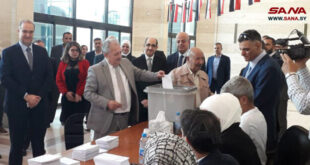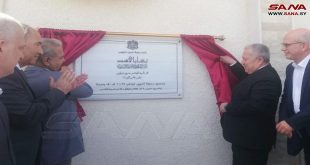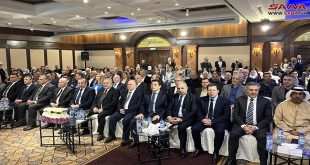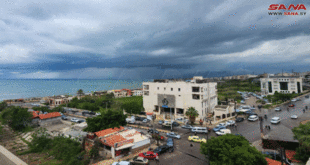Damascus, SANA – The Cabinet on Tuesday discussed a number of services and livelihood issues, including steps to tackle shortages of consumer supplies and their high prices in Deir Ezzor.
The weekly session also addressed achieving balance in electricity rationing among all areas, and ensuring the availability of goods and fuel in certain provinces.
Chairing the session, Prime Minister Wael al-Halaqi addressed rumors spread by some media outlets claiming that imported flour is contaminated with diseases, asserting that these rumors are completely untrue and are part of the propaganda campaign that seeks to spread fear and panic among Syrians.
On the disruptions in supplying drinking water in Damascus during the past week, al-Halaqi said these were caused by terrorist groups’ attacks on al-Fijeh spring and their attempts to control the city’s water supplies.
He also pointed out to the recurring terrorist attacks on electric power lines and fuel pipelines which have had a negative impact on the power sector.
For his part, Deputy Prime Minister, Foreign and Expatriates Minister Walid al-Moallem reviewed the latest political developments in the region and the world, lauding the steadfastness of the people of Sweida and of the Syrian Arab Army in al-Tha’la airport and the southern region.
He also said that UN Special Envoy on Syria Staffan de Mistura had briefed the Syrian government on the results of the talks he held in Geneva, in which he affirmed commitment to Syria’s national standards, specifically the ones pertaining to the unity of its land and people.
In turn, Deputy Prime Minister for Services Affairs, Local Administration Omar Ghalwanji reviewed the state of the communications sector, saying that internet service will be restored to Aleppo soon as well as landline communication between Damascus and the coast after addressing a technical malfunction.
The Cabinet approved the price for purchasing sugar beet crops from farmers at SYP 10 per kilogram, and discussed a bill on licensing private aerial transport companies to operate locally and outside Syria.
Hazem Sabbagh
 Syrian Arab News Agency S A N A
Syrian Arab News Agency S A N A




